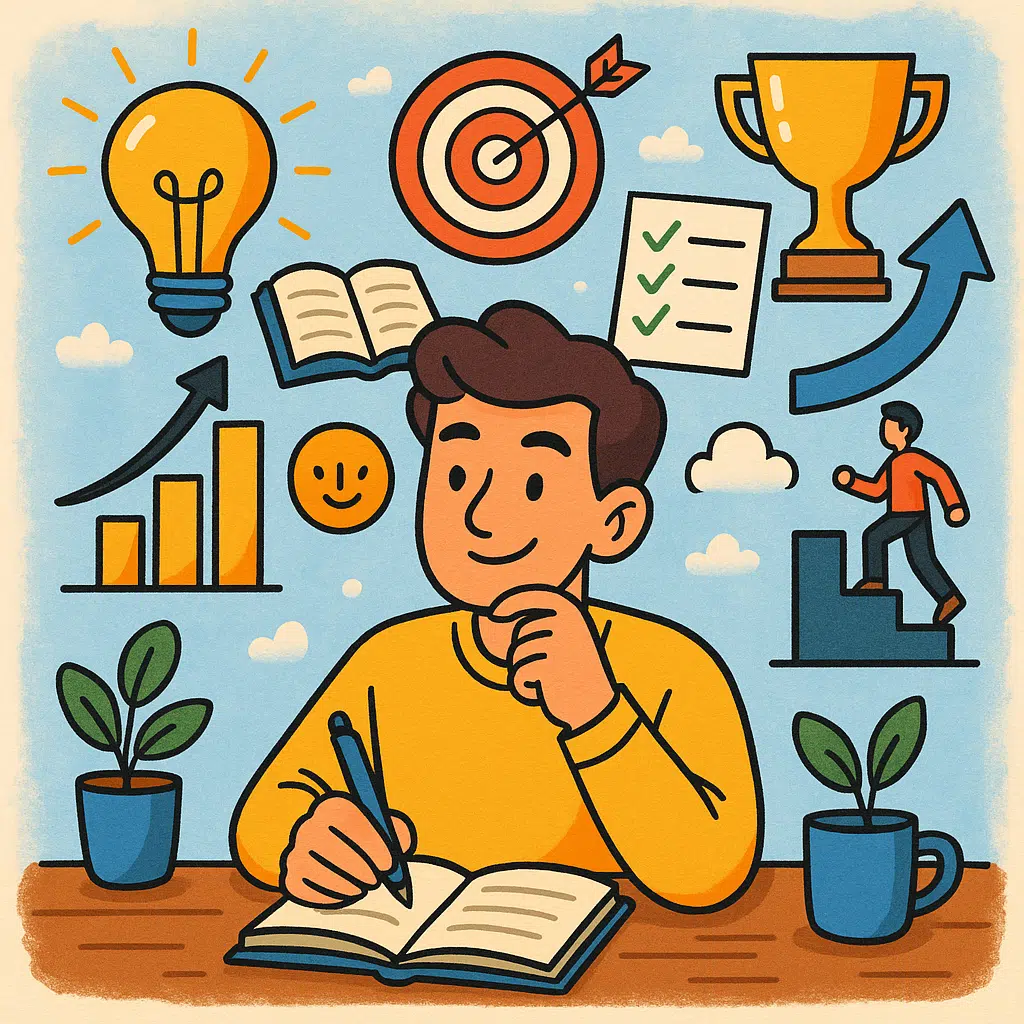Personal Development Strategies for Daily Success
Isabella Lewis August 20, 2025
In 2025, personal development strategies for daily success are evolving fast—blending micro‑habits, emotional resilience, adaptive tech, and cultural routines into effective, easy‑to‑maintain daily practices to help you thrive every single day.

Table of Contents
- Why “Personal Development Strategies for Daily Success” Matter Now
- Trend: Micro‑Habits That Truly Stick
- Trend: Emotional Well‑Being & Mental Resilience
- Trend: Adaptive Tech & AI‑Powered Learning
- Cultural Approach: The Japanese “Shukan” Habit Philosophy
- Strategy: Reflective Practice & Journaling
- Structuring Your Day: Practical Steps for Daily Success
- Bringing It All Together: Your Personalized Daily Blueprint
- Final Thoughts
1. Why “Personal Development Strategies for Daily Success” Matter Now
In a world where burnout is common and attention is fragmented, strategies that help us grow bit by bit—without overwhelm—are especially powerful. That’s why personal development strategies for daily success are more relevant than ever. Instead of massive transformations, it’s about smart, layered shifts that add up consistently.
2. Trend: Micro-Habits That Truly Stick
Small actions done consistently can rewire how you feel and act.
- Daily kindness boosts positivity—performing just five small acts of kindness daily can increase emotional well‑being.
- Gratitude journaling—noting just a few things you’re grateful for each day or week can improve optimism, sleep, goal‑progress, and even physical health.
- Morning sunlight exposure—10 minutes of light first thing supports circadian rhythm, energy, mood, and sleep.
Daily micro-habits to try:
| Habit | Benefit |
|---|---|
| 5 acts of kindness | Uplifts mood, sharpens social bonds |
| Gratitude list (3–10 items) | Boosts optimism, progress tracking |
| Morning sunlight (10 min) | Enhances alertness, sleep quality |
3. Trend: Emotional Well-Being & Mental Resilience
Emotional health is now being recognized as essential to productivity and success.
- Managing emotions—strategies like emotional check‑ins, mindful scheduling, and setting boundaries improve decision‑making and break cycles of burnout.
- Mental hygiene & self‑care—daily stress management, nutrition, movement, and restful habits support long‑term well‑being.
Try this mini-daily emotional check-in:
- Pause and label how you feel.
- Identify one small step to support yourself (e.g., a walk, a break, journaling).
- Reflect after—what helped? What needs adjustment?
4. Trend: Adaptive Tech & AI-Powered Learning
Technology is rapidly becoming a partner in personal growth.
- Personalized platforms & microlearning—learning modules tailored to your pace and preferences help retention and fit into daily routines.
- AI in learning—GenAI tools generate content, detect gaps, and recommend lessons when you need them.
- Emotional intelligence & resilience—digital learning that includes EQ training provides measurable performance gains (e.g., 58% of job success linked to EQ).
How to use this trend:
- Use one microlearning app daily (5–10 minutes).
- Let AI suggest next steps—e.g., “Did you want to continue your Excel lesson or shift to communication skills?”
- Mindfully track emotional growth alongside skills.
5. Cultural Approach: The Japanese “Shukan” Habit Philosophy
“Shukan” means routine, but it’s less about goals and more about disciplined, daily practice. Rather than chasing motivation, you lean on steady repetition to build resilience and character.
In practice:
- Choose one meaningful micro‑habit (like gratitude, movement, or learning).
- Tie it to a daily anchor (e.g., brushing teeth, making coffee).
- Let consistency, not motivation, fuel your progress.
6. Strategy: Reflective Practice & Journaling
Reflection transforms experience into growth.
- Reflective practice used in professional learning encourages deeper insight through critical reflection on daily actions.
- Reflective writing (journaling about experiences, emotions, lessons) enhances self‑awareness, emotional regulation, and adaptability.
Daily reflective prompts:
- What did I learn today?
- Where did I feel most energized (or drained)?
- What’s one small shift I could apply tomorrow?
7. Structuring Your Day: Practical Steps for Daily Success
Here’s how to weave these strategies into a practical routine:
- Morning Light & Gratitude – Open curtains or step outside for 10 minutes. Then write 3 things you’re grateful for.
- Microlearning Break – Mid‑morning, spend 5–10 mins on a learning tool.
- Emotional Check‑In – Around midday, pause: label mood, pick one supportive action.
- Reflective Journaling – Late afternoon or evening, reflect on progress and lessons.
- Kindness Action – Each day, perform at least one small act of kindness.
- Evening Digital Detox – Set aside a tech-free window before bed to reset and unwind.
8. Bringing It All Together: Your Personalized Daily Blueprint
This daily blueprint transforms personal development from abstract concepts into concrete, manageable actions that fit seamlessly into your existing routine. The key is consistency over intensity—small daily practices compound into significant growth over time.
Morning (5–10 minutes)
Natural Light Exposure: Step outside or open your window to absorb morning light. This simple act regulates your circadian rhythm and naturally boosts energy levels for the day ahead.
Specific Gratitude Practice: Write 3–5 detailed gratitude entries. Instead of generic statements, focus on specifics: “I’m grateful my colleague took time to explain that complex process yesterday.” This trains your brain to notice positive details throughout the day.
Pro tip: Add one intention statement about how you want to show up today.
Midday (5–10 minutes)
Focused Microlearning: Choose one skill-building activity that advances your goals—a language lesson, industry article, or mindfulness exercise. Keep a rotating list of 3-5 learning areas to prevent decision fatigue while ensuring balanced growth.
Afternoon
Emotional Check-in: Take 2-3 minutes to identify your current emotional state without judgment. Ask: “What does this feeling tell me about what I need right now?” Make one small adjustment—deep breathing, task switching, or simply acknowledging the feeling.
Evening (10 minutes)
Reflective Journaling: Focus on three questions: What did I learn about myself today? What worked well? What would I adjust tomorrow? This creates a feedback loop that transforms experiences into wisdom.
Connection Practice: Spend 3-5 minutes offering genuine support to someone—a thoughtful message, specific compliment, or simply giving full attention. This strengthens your social network while creating positive emotional ripple effects.
Night
Digital Detox: Unplug 30-60 minutes before sleep to allow mental processing and better rest. Use this time for reading, light stretching, or meaningful conversations.
Weekly Review: Every Sunday, spend 10 minutes assessing what worked, what didn’t, and what small adjustments would improve consistency.
This framework creates sustainable momentum through micro-habits that build on each other, making personal development feel natural rather than burdensome.
9. Final Thoughts
The most impactful personal development strategies for daily success in 2025 are about subtle shifts—blending micro‑habits, emotional awareness, adaptive tech, cultural routine, and reflective insight. It’s not about big leaps but tiny, consistent steps. Start small, stay consistent, and let daily actions evolve into lasting growth.
References
- Covey, S.R. (2020) The 7 Habits of Highly Effective People: Powerful Lessons in Personal Change. Simon & Schuster. Available at: https://www.simonandschuster.com (Accessed: 20 August 2025).
- Duhigg, C. (2014) The Power of Habit: Why We Do What We Do in Life and Business. Random House. Available at: https://www.randomhousebooks.com/books (Accessed: 20 August 2025).
- Clear, J. (2018) Atomic Habits: An Easy & Proven Way to Build Good Habits & Break Bad Ones. Penguin Random House. Available at: https://jamesclear.com/atomic-habits (Accessed: 20 August 2025).







